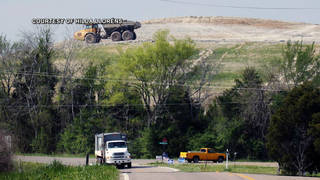How an Alabama Town Is Fighting Against Cancerous & Toxic Coal Ash Dumping—No Thanks to Trump's EPA

Residents of Uniontown, Alabama, have lived with the Arrowhead landfill, which is twice the size of New York's Central Park, have protested shipments of toxic coal ash-the residual byproduct of burning coal-from a massive spill in Kingston, Tennessee, believed to be the largest coal ash disaster in U.S. history. For two years, nearly 4 million tons of coal ash was also shipped by rail from a mostly white Tennessee county to Uniontown. Coal ash contains toxins, including arsenic, mercury and boron, that can affect the nervous and reproductive systems and cause other health problems. According to the EPA, people living within a mile of unlined coal ash storage ponds have a one-in-50 risk of developing cancer. In 2013, some Uniontown residents filed a complaint under Title VI of the Civil Rights Act. This week, the EPA dismissed the claim, saying there was "insufficient evidence." We speak with Ben Eaton, vice president of Black Belt Citizens Fighting for Health and Justice and a resident of Uniontown, Alabama; and with Mustafa Santiago Ali, former head of the EPA's environmental justice program.